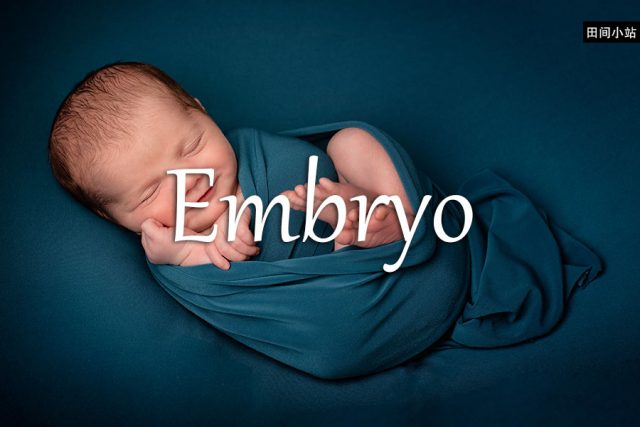本文经授权转载自微信公众号:田间小站

IELTS TOEFL TEM8 GMAT
外刊例句
- The twist would be to decide, on the basis of their DNA, which of a group of available embryos should be implanted and brought to term.
变化在于根据一组可用胚胎的基因来决定应将其中哪一个植入子宫孕育直至分娩。
——《经济学人》 - Seventy-nine embryos survived in the lab, apparently healthy enough to transfer into the uteruses of surrogate monkey mothers.
其中有七十九个胚胎在实验室中存活下来,看起来足够健康,可移植到代孕母猴的子宫内。
——《纽约时报》
基本释义
[noun] an unborn or unhatched offspring in the process of development, in particular a human offspring during the period from approximately the second to the eighth week after fertilization (after which it is usually termed a fetus)
[名词] 胚胎
深入解读
Embryo 一词源自希腊语 embryon (年轻者;幼兽;腹中胎儿),14世纪中期经中古拉丁语 embryo 进入英语后,也是用来表示“胚、胚胎”,即发育过程中未出生或未孵化的后代,尤指受孕后第2周到第8周的“人类胚胎”(8周之后通常被称为“fetus”,即:Fertilized egg → Embryo → Fetus),比如:
- 成熟胚
mature embryo - 胚胎移植
embryo transfer - 人的胚胎
human embryos
从这个概念出发, embryo 很自然地就被用来喻指“萌芽状态的事物”或者事物的“萌芽期、初期、萌芽状态”,并常用习语 in embryo 表示“在胚胎阶段、在萌芽时期、尚未成熟”,强调处于显示出发展潜力的初级阶段,比如:
- 一种想法的雏形
the embryo of an idea - 一场消耗战在酝酿中。
A war of attrition was in embryo.
此外, embryo 也可用作形容词表示“萌芽阶段的、初期的、未成熟的”,比如:
- 这位尚未成熟的政治家被他自己党内的成员投票表决赶下台。
The embryo politician was ousted from office by a vote from members of his own party.
名著用例
The very first thing which she had noticed in her life, was—what?—not the mother's smile, responding to it, as other babies do, by that faint, embryo smile of the little mouth, remembered so doubtfully afterwards, and with such fond discussion whether it were indeed a smile. By no means! But that first object of which Pearl seemed to become aware was—shall we say it?—the scarlet letter on Hester's bosom!
她降生以来所注意到的头一件事情是——什么呢?不是母亲的微笑——别的孩子会学着用自己的小嘴浅浅一笑来呼应,事后会记忆模糊,以致热烈地争论那到底是不是真的在笑。珠儿意识到的第一个目标绝不是母亲的微笑!似乎是——我们要不要说出来呢?是海丝特胸前的红字!
出自美国浪漫主义作家纳撒尼尔·霍桑(Nathaniel Hawthorne)于1850年出版的长篇小说《红字》(The Scarlet Letter: A Romance)。
同近义词
- fetus: an offspring of a human or other mammal in the stages of prenatal development that follow the embryo stage (in humans taken as beginning eight weeks after conception)
- germ: the embryo in a cereal grain or other plant seed
- rudiment: an undeveloped or immature part or organ, especially a structure in an embryo or larva which will develop into an organ, limb, etc.
